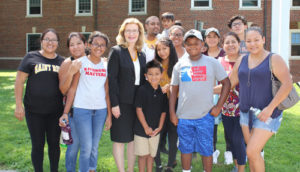When I first set foot on the campus of the University of Colorado at Boulder as an undergraduate, I had no idea what I was doing. My parents had not gone to college. Three of my grandparents had not even graduated from high school. No one in my extended family had advised me about choosing or preparing for college, let alone could they help me in navigating a university once I got there. I quickly realized that I had to figure out higher education on my own, and fast.
Nationwide, one out of every three first-year students start their first semester of college under similar circumstances, according to the National Center for Education Statistics. That is also true at the institution I lead, The College of Saint Rose, in New York, where more than 30 percent of the students in our most recent first-year class are the first in their families to go to college.
While every personal situation is unique, students’ feelings and experiences are not—especially during the first year on campus. Almost all first-year students will feel overwhelmed at some point during the transition to college, and that emotion is magnified even more for first-generation college students who have little or no understanding of what is expected of them and what campus life will be like.
As educators, it is our responsibility to help first-generation students tackle as many of the educational, financial, social, and personal challenges that we can. Our support is vital to their success.
Here are five ways that all of us in higher education can help make their dreams a reality.
1. Establish programming specifically for first-generation college students.
Resources and support services customized to first-generation college students are necessary to help them during their first year. On our campus, our new division of student success and engagement launched a mentoring program three years ago for first-generation students called FLIGHT (First-Year Leaders Influencing Generations with High Tenacity).
Through this program, each student is paired with a personal FLIGHT Guide—faculty and staff who in most cases were first-generation college students themselves. Our FLIGHT Guides serve as personal mentors to their students, a role that takes many forms, including campus resource, motivator, and coach. FLIGHT works in conjunction with our other first-year experience initiatives, which together are designed to support a successful academic and personal adjustment to college life.
2. Create and nurture an inclusive campus community.
Today, higher education is more accessible to a wider array of people, and diversity and inclusion are practiced and celebrated on campus. That does not mean that all students feel supported or accepted, however.
There were times I doubted myself as an undergraduate, but in those days, no one in my family or at my university talked about those things. Lack of confidence, coupled with unfamiliarity with the higher-ed environment and the need to work for wages, can lead to isolation and loneliness. Faculty members, academic coaches, personal advisors, and counselors all play an important role in helping first-generation college students acclimate to campus communities. We must actively introduce them to these resources, and create opportunities and touchpoints for personal engagement—from face-to-face meetings to periodic phone calls and texts—to support the transition to college, offset anxiety, and help students develop positive, meaningful connections that will serve them during their time on campus and beyond.
3. Encourage students to ask for help.
I distinctly remember sitting down to read the course catalog for the very first time and trying to use it to chart a path that would lead to a degree. Fortunately, there are many professional offices at colleges and universities with the sole purpose of helping students succeed today. Our job is to help students find the places where they can have every last one of their questions answered, and we must encourage them to continue to seek guidance from individuals and support networks that will help them grow and learn.
4. Demystify financial aid.
It is no secret that financial aid can be confusing and difficult. This is even more the case for students and families who lack the experience, education, language facility, or time to sort through the complexities of the process. Taking time to guide first-generation college students and their families through the available options—including FAFSA, outside scholarships, and work study programs, among other—can help them overcome financial obstacles and challenges that stand in the way of a college education. The phrase “financial aid” will not be daunting if we make the process of researching and applying for aid as simple, transparent, and inviting as possible.
5. Include family.
Family members of first-generation college students typically have no idea of what the environment is like on a college campus, and how could they? At Saint Rose, we make it a point to do all that we can to help family members understand the possible stressors and issues facing first-year students. This starts with a College 101 workshop for parents during orientation and continues with regular communications and tips for supporting students from afar throughout the year.
All students deserve equal access to higher education. It is up to us as leaders to encourage, mentor, and advise first-generation college students, and to create the programs and processes they need to be successful. Doing so will help them to transform their lives, and their families, for generations to come.
- 8 top trends in higher education to watch in 2024 - April 16, 2024
- Defining a path to equitable AI in higher education - April 12, 2024
- Leveraging AI-driven edtech for continuous improvement in higher ed - April 11, 2024

